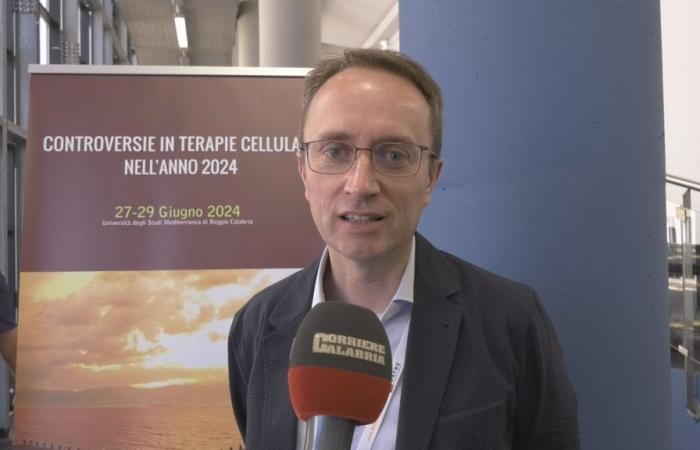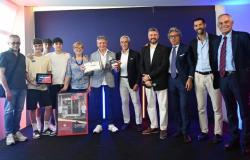REGGIO CALABRIA Controversies and discussion, these are some of the most recurring terms in the three days underway in Reggio Calabria and focused on the discussion between hematology and transplantology professionals. The place chosen is no coincidence, in the city of the Strait it has been operational for some time, a center of excellence capable of standing out for its competence and performance at a national level and beyond. Many researchers came from outside the region to study in depth all the aspects that characterize the new frontier of cellular therapies. «It is very important to be here in a center of excellence in Calabria to talk about the future. We debate – Stefano Luminari, hematologist at the IRCCS hospital in Reggio Emilia and professor at the University of Modena-Reggio Emilia, tells Corriere della Calabria – on the use of drugs that until a few years ago we didn’t even imagine could reach the clinic. We talk about myeloma, lymphomas and the drugs we discuss have the ability to revolutionize current concepts that guide us in the therapeutic choice. In fact, they allow us to glimpse a future for our patients without chemotherapy, exploiting and stimulating the immune system’s ability to fight the disease in a more physiological way.”
CAR T drugs and bispecific
The options on the table, and also the subject of discussion in Reggio Calabria, are two: meanwhile the CAR T, a sort of living drug that begins with the collection of the patient’s lymphocytes, lymphocytes which are then engineered with the introduction of the CAR receptor (Chimeric Antigen Receptor) capable of recognizing tumor cells. CAR-T cells are then infused into the patient’s blood to attack and destroy the tumor cells. The other option it is that of bispecific drugsthese are monoclonal antibodies, synthesized in the laboratory using bioengineering or genetic engineering techniques, capable of guiding the cells of the immune system towards those of the tumor. For Stefano Luminari «the one between bispecifics and CAR T is a challenge between two treatment modalities, a challenge only at the beginning and I think we can truly say that we will see some good ones». A path that directly involves centers of excellence “certainly – adds Luminari – the clinical results for the patient are very important, but the organizational challenge that these therapies entail is also very important, in fact these are complex therapies that involve a system rather than a department and individual doctors”.
CAR T in the description provided may appear to laymen as something more “innovative” perhaps, but the other drugs also have significant potential. «bispecific drugs – explains Luminari – from a molecular point of view are more similar to those we have always used, they are antibodies but unlike those we used in the past and which recognized only one target, the bispecific ones recognize two targets. One target is the tumor cell, the other is an immune system cell, in particular lymphocytes. The recognition of the double target, with the same molecule, leads to bringing two cells closer together that only because of the “physical contact” are activated against each other and in this case the immune system is capable of eliminating and destroying the tumor cell». «They are drugs – Luminari specifies – very powerful and this translates into some manifestations, some side effects that we are learning to manage but which are certainly very far from the effects of the chemotherapies we used in the past.” The most obvious question is whether we are dealing with alternative or competing drugs «there is no rule to guide us. The two drugs have never been compared head to head to say one is better than the other. There are characteristics of both treatments that allow us to define an ideal patient profile. CAR T requires hospitalization, a short but still hospitalization that can be associated with risks, and are drugs that are administered in reference centers that can be kilometers, hundreds of kilometers from the patient’s home. The Bispecific drug, on the other hand, is a treatment more similar to what has been used up to now, it is administered in day hospital, sometimes even subcutaneously, and is a continuous therapy that can be done closer to the patient’s home, always in specialized centers but certainly more patient friendly and it can be used more widely in centers that are not authorized to perform CAR T”.
Alati: «We expect to give more and more space to combination therapies»
And speaking of the promising professional resources that Calabria can have at its disposal in these areas, in the three days of Reggio one of the masterly readings was entrusted to a young professional working at the haematology unit of the Metropolitan Hospital of Reggio Calabria, Caterina Alati, called to delve deeper into what the future of therapy for acute leukemia could be: «The treatment of acute myeloid leukemia has changed in the last ten years, the panorama of new target agents and new immunotherapies has in fact expanded considerably». «This – Alati tells us – has certainly allowed us to improve the outcomes understood as responses to treatment and survival but even now there are aspects that can be improved».
«In the future – adds Alati – we expect to give more and more space to combination therapies, combine what we define as backbone, i.e. chemotherapies and modern therapeutic approaches, with target drugs that have more efficacy and less toxicity.” There is an element that needs to be paid attention to, when we talk about the future it doesn’t mean that the path is not already underway, on the contrary «for some years we have started using these target drugs, for example – specifies Alati – a myeloid leukemia acute illness characterized by a particular gene mutation called FLIT3 has been treated for several years by combining standard chemotherapy with a FLIT3 inhibitor called midastaurin.” A path that has already begun and which marks further progress «here I present some data – adds Alati – illustrated at the last EHA, the European congress on haematological diseases, and in which there are developments with new target agents. Any examples? «Quizartinib and Crenolanib, which are new FLIT3 inhibitors that are currently being used in trials, have already been approved by the FDA, the Food and Drug Administration, the American control body, and which will soon also arrive in Italy after the approval of the European and Italian body”. The final consideration, therefore, is quickly formulated «in reality we are talking about a future that is not that far away, in fact it will be immediate. The Hematology Center and Transplant Center of Reggio Calabria, as happens in many other Italian cities, can offer these drugs through various modalities, clinical trials, clinical trials, or so-called compassionate uses which allow quicker access. In short, we are at the last step, there have already been phase 1 and 2 studies which usually evaluate the safety of the drug, phase 3 studies evaluate the effectiveness and have already given consolidated results. This will allow the rapid introduction of these drugs into the market but there are many others being studied in phase 1 and 2″. The last topic reviewed by Caterina Alati concerns the commitment in the Reggio hematology center «I am part of an Italian group that deals with acute myeloid and acute lymphoblastic leukemia, many of our realities are similar. It is obvious that there are hematological centers that have easier structural accessibility, but in our facilities there is essentially nothing missing. Perhaps there is a lack of personnel but in reality we are able to offer citizens and patients the same therapeutic approaches that they could receive in any other Italian hematology, certainly with some personal sacrifice and a little more dedication but certainly with an adequate quality of work». ([email protected])
Corriere della Calabria is also on WhatsApp. Enough click here to subscribe to the channel and always be updated






